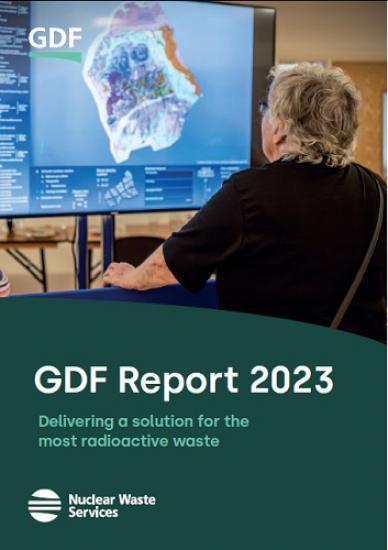Geological Disposal Facility (GDF) Report highlights real progress
30th June 2023

This latest report published yesterday (29 June 2023) is pertaining to places in England but maybe interest here in the north of Scotland with connections in Caithness at Dounreay.
The Geological Disposal Facility (GDF) Report has been published today and sets out significant progress of the programme to deliver a safe and permanent solution for the UK's most radioactive waste.
The report from Nuclear Waste Services (NWS) highlights:
Engagement with four communities across England, three in Cumbria, Mid-Copeland, South-Copeland and Allerdale, and one in Lincolnshire around Theddlethorpe, about what hosting a GDF could mean for them. Community Partnerships are now well established in these areas and provide a platform for sharing information and engaging with communities.
The formation of Community Partnerships has so far unlocked more than £3m of Community Investment Funding, supporting around 80 projects from community youth schemes to mental health initiatives, and driving real positive change in those places. This means that there are clear benefits already to communities participating in the process.
Site evaluation work is moving forward with studies to assess potential site suitability for hosting a GDF underway. The first marine geophysical survey off the coast of Copeland, Cumbria, was successfully carried out in August 2022 - we expect the results to be available to start to be shared later in 2023. We have also purchased existing geophysical data for other search areas on both East and West Coast locations as an efficient and cost-effective way to get initial information on local geology.
NWS CEO Corhyn Parr said, "NWS is here to make nuclear waste permanently safe, sooner. And that includes the most radioactive waste destined for a GDF.
We're seeing great progress with the GDF programme as we engage with four communities across England about the possibility of hosting a GDF. We're having important conversations, answering questions, and sharing information, and I'm particularly pleased that funding for those participating in the process is already making a huge difference to local people.
We're now beginning to evaluate sites and their suitability for a GDF and looking forward to assessing the results of a range of studies to help inform decisions in the future.
Looking ahead, we will continue our engagement with the four existing Community Partnerships - and the door remains open for new communities to join the process. We’re also preparing for upcoming phases on the programme and working towards the major permissions required for a project of this scale and importance.
A GDF is a long-term project and we’re making good early progress as we work to take responsibility for future generations.
The UK has been producing and managing radioactive waste for many decades and will continue to do so for many more. Nuclear power is viewed by the UK Government as essential to the green energy mix and a secure energy supply for all. Therefore, the ability to safely manage nuclear waste today and for future generations is vital.
A GDF ensures we remove the burden from future generations of having to keep the waste safe and secure in above ground storage facilities for many thousands of years That is why we are delivering a GDF designed to be a safe and permanent solution for the UK’s most radioactive waste.
A GDF is projected to create thousands of jobs for more than a hundred years and provide opportunities for investment in local infrastructure, such as transport and flood defences.
We’ve also seen significant progress of international GDF programmes. There are more than 20 countries at different stages of GDF consideration and development around the globe, with Finland’s GDF to start operating before the end of the decade, Sweden and France on track for the 2030s, and Switzerland set for the 2050s.
Read the full report HERE
Pdf 20 Pages.
Related Businesses
Related Articles
